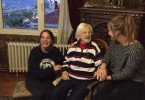Aslı TUNÇ
Leaving 22 degrees of lovely spring weather back home in Istanbul, I was on a plane with dozens of extremely silent Finnish passengers heading up North to Helsinki. As an experienced traveler, I had already read Finnish history, culture and about five must-see places in the city (such as Uspenski Cathedral, National Museum, the Opera House, Design District, etc.). Approaching the airport, the first sight was bulks of ice melting in the Gulf of Finland. It was a sign that I should better forget the meaning of “spring” in Mediterranean terms for a week.
Although my aim was to give seminars at the University of Helsinki, I also had a chance to observe everyday life and culture in Finland and the media scene in the country. Many things I experienced are not written in any travel books or blogs. And I believe that is precisely the most refreshing part of traveling.
When I stepped on the Finnish soil, I had a connection problem on my Blackberry. Although it was annoying not to be able to call anybody in Turkey, I did not mind that much, since I was in the “Nokia Land” where all the communication problems could be solved easily. Well, at least so I though. As soon as I arrived at the center, I entered the Central Railway Station, a landmark of the city with a unique clock tower and the two pairs of statues holding the spherical lamps on either side of the main entrance. I was hundred percent sure that I would find a public phone in this busiest location or an international calling card like in any other European city. When I asked the man at the kiosk, he said with a smile that they don’t use public phones anymore. They assume that everybody has a cell phone. Also they don’t sell calling cards for years now. I stood there as if a time-machine had planted me there in some unknown period in the future. The irony was that there is no future tense in the Finnish language. The future was literally present. In this city where everybody was online and connected 24/7 in all public places without any charge, there was no chance for a tourist with a broken, stolen or lost cell phone to establish communications. Another futuristic experience came with purchasing tickets for trams and public buses. A passenger can send a text message (SMS) indicating the line s/he wishes to take and gets on a tram or a bus. By sending the SMS message, the ticket fee is automatically deducted from the passenger’s bank account. The passenger shows the text message if there is a ticket control as the proof of payment.
I had various sociological observations of a culture where silence, solitude and modesty were valued and a simple lifestyle with no extravagance is appreciated. Finns’ straightforwardness is an intrinsic feature even of their language where there is no word for “please” and no place for casual conversations. Minimal talking and facial expressions along with excessive alcohol consumption resemble them more to Russians than Swedes. On the other hand, their incredible sophisticated taste in design and minimalist aesthetics and a high level of intellectual and artistic life were quite impressive. But what impressed me most was my visit to Union of Journalists in Finland. Founded in 1921, the Union has over 15,000 members working in journalism profession. The union members also include online journalists, radio and TV reporters. The number of its members keeps increasing every year. The Union negotiates collective agreements and pleads the common cause for its members’ better financial and working situations. They issue press cards so that the members can benefit from the advantages and services provided by the union. The membership fee covers accidents, travel insurances, liability and legal expenses if necessary or any personal or material damage on duty. The Union has two holiday resorts in the mountains and two holiday apartments in the centre city and has shares in a Golf Club. They have also a global presence in solidarity with other Nordic Journalists and European Associations. The Union defends copyrights of the journalists and critically follows the debate on ethical issues. Mr. Juha Rekola who was responsible for media policy and international affairs showed me their website where all the decisions about cases on malpractice and unethical professional behavior listed with detailed explanations including fines and other disciplinary measures for each offense. All decisions are transparent but anonymous. But Mr. Rekola mentioned that the biggest disgrace for a Finnish journalist is being exposed on the cover of a newspaper and called “unethical.” Finnish approach to journalism, ethics and union rights was too good to be true and also it sounded as if coming from another planet just like as their climate and social habits. But it was enough to warm my heart in the chilly arctic weather of Helsinki.
For further information on Finnish Media Scene:
http://finland.fi/netcomm/news/showarticle.asp?intNWSAID=27113
http://www.uta.fi/jourtutkimus/migration_media.php
http://www.kepa.fi/palvelut/julkaisut/raportit/pdf/010_finnish_press.pdf






